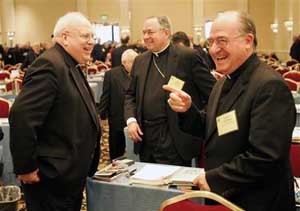-
- Fight against ‘judicial activism’ to continue despite election
- Catholic bishops pass guidelines to gay ministry
- Gay rights leader says election produced solid gains for gay community
- Mass. lawmakers delay decision to put same-sex marriage amendment on ballot
- HIV patients live years after diagnosis
- Houston landscaper accused of refusing service to gay couple
- National News Briefs
- World News Briefs
national
Catholic bishops pass guidelines to gay ministry
Gay Catholic activists say document a failure that will push gays and lesbians away from the church, bishops insist they’re trying to be more ‘welcoming than condemning’
Published Thursday, 16-Nov-2006 in issue 986
BALTIMORE (AP) – The nation’s Roman Catholic bishops overwhelmingly approved new guidelines on Nov. 14 on outreach to gays and lesbians, trying to support gay and lesbian parishioners while strictly affirming the church stance that same-sex relationships are “disordered.”
Gay Catholic activists immediately judged the document a failure that will push gays and lesbians away from the church.
The statement, “Ministry to Persons with a Homosexual Inclination,” upholds the Catholic prohibition against same-gender marriage and adoption by gay or lesbian couples.
Yet bishops insisted that they’re trying to be more “welcoming than condemning.”
The document says it’s not a sin to be attracted to someone of the same gender, only to act on those feelings. The bishops also state that children of gay and lesbian Catholics can undergo baptism and receive other sacraments in most cases if they are being raised in the faith.
Still, under the guidelines, parishes must instruct gays and lesbians to remain celibate. The bishops are also discouraging gays and lesbians from making “general public self-disclosures” within their churches about their sexual orientation.
“It is not sufficient for those involved in this ministry to adopt a position of distant neutrality with regard to Church teaching,” the bishops stated. Gay and lesbian outreach must include teaching that is “welcoming yet challenging, loving but firm in the truth,” they said.
The 194-37 vote, with one abstention, came at a meeting of the U.S. Conference of Catholic Bishops.
Sam Sinnett, president of DignityUSA, an advocacy group for gay Catholics, said the new guidelines reflect the bishops’ ignorance about sexuality. He said the document would alienate gays and lesbians.
“This document recommends the most unhealthy thing to do, which is to stay emotionally and spiritually in the closet,” Sinnett said.
Some bishops anticipated such criticism.
“For the person with the inclination, they find that very, very difficult to accept, personally,” said Bishop Kevin Boland of Savannah, Ga., during the floor debate on Nov. 13. “They feel that the church is saying to them that as a person they are disordered. I recognize that it is crucially important to say this, but to apply it pastorally it can be difficult.”
On another matter this week, bishops overwhelmingly adopted a statement encouraging Catholics to obey the church’s ban on artificial contraception.
Church leaders at the gathering also discussed how Catholics can make themselves worthy to receive Holy Communion. Several bishops said Catholics who persist in ignoring church teaching, including gays and lesbians who are sexually active, should not take the sacrament.
There was a time when the U.S. Conference of Catholic Bishops was a powerful force for bringing the church’s moral teachings to bear on national policy debates.
In the 1970s, the bishops led the fight against abortion after Roe v. Wade. During the Cold War, they drew international notice when they questioned the morality of nuclear deterrence.
But the bishops now face a different world – one where their moral authority has been diminished by the clergy sex abuse crisis, where money for church programs is scarce and where many American Catholics have little understanding of, or regard for, church teaching.
The bishops at the conference this week sought to channel resources away from broad social pronouncements and focus more on defining Catholicism for an often uninvolved flock.
“It’s not that the bishops as a national organization will no longer be interested in sociopolitical issues,” said Russell Shaw, a writer on Roman Catholic issues who spent more than 15 years as a spokesperson for the conference. “But the emphasis is shifting to the life of the church itself and its own internal problems.”
For many Catholics, the changes are long overdue. Bishops have complained for years that the funds they turn over for conference work are badly needed in their home dioceses. Others consider the large staff unnecessary, a hangover from the conference’s heyday in the early 1980s, when revered Chicago Cardinal Joseph Bernardin was guiding its work and the prelates undertook such ambitious projects as the pastoral letter on nuclear war called “The Challenge of Peace.”
But critics see the turn inward as disturbing. The Rev. Thomas Reese, former editor of the Jesuit magazine America, noted that the agenda included no mention of the war in Iraq, although bishops could still raise the topic from the floor.
“It’s the most important moral issue facing the country, and in the past the bishops would have said something about it,” Reese said.
|
|
Copyright © 2003-2025 Uptown Publications


